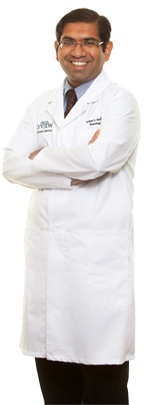 The Sleep Center at Chesapeake Regional Healthcare
The Sleep Center at Chesapeake Regional Healthcare
By the time Soham Sheth was a high school student in Ahmedabad, India, he already knew he wanted to become a physician. He had relatives who were doctors, and he had gone with them to volunteer at the Bhansali Trust in Radhanpur, one of the peripheral areas of the Gujarat state of India. He worked with the Trust in some of India’s remote villages, participating in diagnostic camps, health exhibitions and educating health workers. Those early experiences confirmed that he wanted a career in medicine.
By 1999, he had graduated from Smt. NHL Municipal Medical College in Ahmedabad, and was beginning a rotating internship at VS General Hospital. His initial medical focus was ophthalmology, but after five or six months, he started to realize that was likely not going to hold his interest.
About the same time, he had the opportunity to come to the United States to complete a Masters in Public Health at Johns Hopkins School of Public Health. “I wasn’t about to pass up that chance,” Dr. Sheth remembers. It was a wise decision that led to other opportunities: first, a post-doctoral research fellowship at Johns Hopkins School of Medicine. His initial project was in neuro ophthalmology, which fit perfectly with his growing interest in neurology. “My main love was neuro muscular medicine and peripheral neuropathy,” he says, “and almost all of my research was in that area.”
He completed an observership at Hopkins under attending physician Michael Polydefkis, MD, Director of the Cutaneous Nerve Lab and Director of Neurology at Johns Hopkins Bayview Medical Center. He later left Maryland for Detroit, where he completed a residency in neurology and was chief resident in the neurology department at Detroit Medical Center, Wayne State University. He also completed a fellowship in neuromuscular/clinical neurophysiology at Detroit Medical Center, Wayne State University.
He came to Virginia to join Chesapeake Regional Medical Center as its Stroke Director in 2008.
Dr. Sheth still considers neuromuscular neuropathy one of his main specialties and admits that his career focus on sleep medicine was born of a personal experience. “When I moved to America, I began gaining weight, quite a bit, actually,” he says. “I was young, 21 years old, and I didn’t know how to cook. I had little money and little spare time, so I stayed on a fast (junk) food diet.”
He began to notice that he was having trouble concentrating, even to the point of having difficulty getting through one of his rigorous exams. “I had never had any trouble with exams,” Dr. Sheth remembers. “I tried to figure out what was going on, and realized that I was snoring.” He had studied sleep medicine during his residency and fellowship, and recognized that he had developed obstructive sleep apnea secondary to his weight gain and got treatment. He also went into action: eating more healthfully, losing weight, exercising, and paying better attention to his sleep habits. When he lost the weight, his symptoms improved.
“I realized how important sleep is,” Dr. Sheth says, “and I felt the need to help patients with sleep difficulties as well.” There are many such people, many of whom go undiagnosed for some time.
For example, in his capacity as Stroke Director for Chesapeake Regional Medical Center, he sees many patients who have sleep apnea that had never been explored. “We know that sleep disorders are an independent risk factor for strokes,” he explains, “but they also adversely affect other conditions as well.” In fact, he says, he often finds sleep problems in patients who were not referred for sleep issues: “We have patients referred for headaches, or for fatigue and other presentations, and we find they have primarily a sleep problem.” Board certified in neurology, neuromuscular medicine, electrodiagnostic medicine and sleep medicine, Dr. Sheth frequently sees patients who describe chronic ‘sinus headaches.’ However, he notes, “Most patients who wake up every day with headache are probably suffering from sleep apnea.”
He routinely sees patients who have high blood pressure, diabetes out of control, small vessel damage in the brain, and even irregular heartbeat – all related to sleep disorders.
It can be especially concerning for young patients. Too often, these adolescents are being put on a variety of different headache medicines, when in fact, a thoughtful exam or sleep study would reveal an underlying sleep problem, and avoid giving medicines that can potentially cause damage.
Of course, in younger patients with headache and/or insomnia, Dr. Sheth says, the culprit is often found at the end of a USB port. “There are many things that contribute to poor sleep,” he says, “including stress, trauma, anxiety. But to me, the gadgets are the main problem today.” He explains: when it gets dark, the brain secretes melatonin, the chemical hormone that indicates it’s time to sleep. But watching television, or playing with iPads or other devices that give off artificial light trains the brain that in fact, it’s not time to sleep.
“So the brain doesn’t secrete melatonin,” Dr. Sheth tells his patients, and cautions, “it doesn’t have any appreciable effect for a few days or even a few weeks, but over the years, it becomes a very big problem.”
So important is sleep and the role it plays in maintaining good health, that Dr. Sheth believes a sleep component should be part of every patient’s history and physical examination: “Good, restful sleep is vital to a healthy lifestyle. It benefits the organs, the weight, the skin, the mood – and so much more.”

